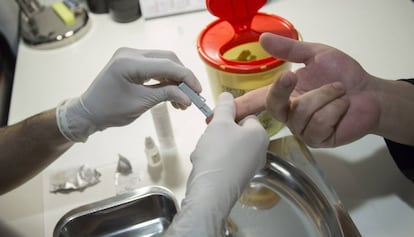Shigellosis, the painful infection spreading via sexual transmission that has Europe on alert
The ECDC has raised the alarm about the spread of the bacteria among men who have sex with men. ‘Shigella sonnei’ causes stomach problems, such as diarrhea and gastric pain


Under the microscope, the bacteria Shigella sonnei looks a bit like a worm. It’s a long, rod-shaped structure that causes stomach problems, such as diarrhea and gastric pain, and is one of the main culprits behind food poisoning outbreaks. But this small bacillus in the Enterobacteriaceae family (which also includes E. coli) has been rapidly spreading in several countries in Europe not via contaminated food but via sexual transmission.
The situation is of such concern that the European Centre for Disease Prevention and Control (ECDC) has released a report warning of a rise in shigellosis cases. The infection caused by the bacteria can lead to intestinal problems, and in the worst-case scenario, gastric ulcers and dysentery (diarrhea containing blood or mucus). The ECDC document noted that this rise has been particularly notable among “men who have sex with men (MSM)” and warned that some of the cases detected were resistant to antibiotics.
The United Kingdom was the first to raise the alarm: in four months, between September 2021 and January 2022, it reported 47 cases of extensively-drug resistant Shigella sonnei infections. This figure was triple the number that had been reported in the previous 17 months, when only 16 cases were detected. British authorities also warned that most of the infections were affecting men who have sex with men. Following this warning, the ECDC called on all European Union states to gather information on the spread of the bacteria in their territories.
Between 2020 and February 17 of this year, the European health organization registered at least 147 cases of shigellosis with the same antibiotic resistance or that were genetically related to the group of infections detected in the UK. These cases, reported in nine countries (Austria, Belgium, Denmark, France, Germany, Italy, Ireland, Norway and Spain), also shared the same profile: affecting MSM, and spreading via sexual transmission.
The main ways the bacteria is spread is via ingesting contaminated food and water or via the so-called fecal-oral route, explains José Luis Blanco, a specialist in infectious diseases at Clínic Hospital in Barcelona, in the Spanish region of Catalonia. “Transmission via the fecal-oral route could be due to direct contact, in anal sex, or due to indirect contact, following anal sex relations, when dildos are used, or fisting or analingus are practiced,” he says.
According to British authorities, in outbreaks where there was information about the source of the contagion, private sex parties and bathrooms were the likely sites of transmission. Both the Spanish Health Ministry and the ECDC have also raised warnings about chemsex, a practice that involves using drugs to have sexual relations over a long period of time. Experts warn these dynamics are linked to shigellosis outbreaks, as drug consumption can increase the likelihood of high-risk sexual practices.
In Spain, doctors say they have not seen any noticeable rise in shigellosis infections. A March report from Spain’s National Microbiology Center identified 19 cases in 2021 and seven in 2022, with the same antibiotic resistance. But Jorge García, a specialist in infectious diseases at the Vall d’Hebron Hospital in Barcelona, says that he has seen occasional cases of “gastroenteritis due to Shigella” and admits “the resistance has increased.” Indeed, a study on infections in Barcelona among men who have sex with men between 2015 and 2019 already warned that the pathogen was becoming increasingly resistant to antibiotics. “The ECDC has seen that these bacteria have a drug-resistance profile and the concern is that they are able to spread,” says García.
Most shigellosis infections are mild, but there is concern over how drug resistance will affect the most severe cases. “Normally, we use [antibiotic treatments such as] fluoroquinolones or azithromycin against shigellosis: the patient takes it at home and doesn’t need to be admitted,” explains Blanco. “But when the disease is enteroinvasive [it is more severe and enters the intestinal wall], we use third-generation cephalosporins [a class of antibiotic derived from a fungus].” The problem is that outbreaks such as the one recorded in the UK are resistant to all these drugs and more. In these cases, doctors turn to carbapenems, the final antibiotic tool against these superbacteria.
“Sexually transmitted infections are of extreme interest to the World Health Organization given the impact that possible outbreaks could cause on public health and the risk that they spread drug resistance,” says Blanco.
For MSM who have caught the infection, the ECDC recommends refraining from sexual relations until a week has passed since the disappearance of symptoms. It also proposes increasing hygiene measures, such as washing genital and anal areas before and after sex, using latex gloves when practicing fisting and recommends against sharing sex toys. Symptoms of shigellosis can last between five and seven days, but the bacteria can remain in the system for another four to six weeks.
Tu suscripción se está usando en otro dispositivo
¿Quieres añadir otro usuario a tu suscripción?
Si continúas leyendo en este dispositivo, no se podrá leer en el otro.
FlechaTu suscripción se está usando en otro dispositivo y solo puedes acceder a EL PAÍS desde un dispositivo a la vez.
Si quieres compartir tu cuenta, cambia tu suscripción a la modalidad Premium, así podrás añadir otro usuario. Cada uno accederá con su propia cuenta de email, lo que os permitirá personalizar vuestra experiencia en EL PAÍS.
¿Tienes una suscripción de empresa? Accede aquí para contratar más cuentas.
En el caso de no saber quién está usando tu cuenta, te recomendamos cambiar tu contraseña aquí.
Si decides continuar compartiendo tu cuenta, este mensaje se mostrará en tu dispositivo y en el de la otra persona que está usando tu cuenta de forma indefinida, afectando a tu experiencia de lectura. Puedes consultar aquí los términos y condiciones de la suscripción digital.








































